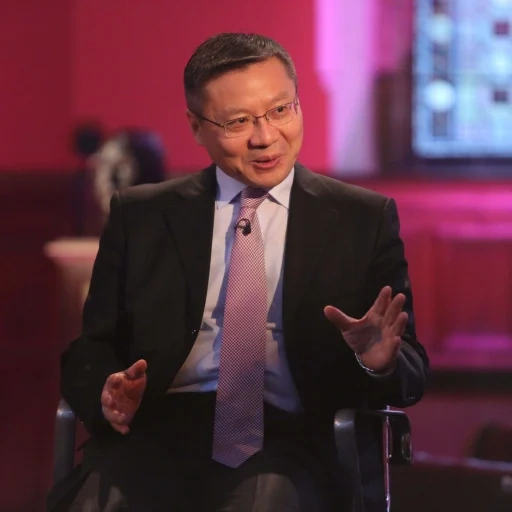This Dialogue Unveils the Key to Asia’s Win-Win for 2 Billion People
The friendship between China and Malaysia dates back more than 500 years, with diplomatic relations formally established fifty years ago. On the 10th May, prominent Chinese scholar Zhang Weiwei interviewed Minister of Higher Education Malaysia: Zambry Abd Kadir during a visit to Malaysia. He is also the former Malaysian Foreign Minister. The following is an edited excerpt of their dialogue, exploring the enduring bond between the two nations.
 Chinese Foreign Minister Wang Yi, also a member of the Political Bureau of the Communist Party of China Central Committee, meets with Malaysian Foreign Minister Zambry Abdul Kadir in New York, the United States, Nov. 28, 2023
Chinese Foreign Minister Wang Yi, also a member of the Political Bureau of the Communist Party of China Central Committee, meets with Malaysian Foreign Minister Zambry Abdul Kadir in New York, the United States, Nov. 28, 2023
Professor Zhang Weiwei:
Mr Minister, it’s such a pleasure to have you here and to hear your valuable insights and also to share with us your wonderful ideas on various topics. So given the diversity in the country like Malaysia and also the extremely complex nature of South East Asia, as you used to be Foreign Minister of Malaysia, when you look back, what’s the main experience of Malaysia to ensure national unity? And additionally how unity can be ensured throughout Southeast Asia?
Minister Zambry Abd Kadir:
Thank you, Professor Zhang, for your important question. To fully address it, we must examine the larger societal picture of how communities in Malaysia and Southeast Asia developed. A broader perspective embraces the diverse civilizations that converged here, including Islamic, Chinese, and Indian influences. I would argue that Malaysia exemplifies the unique cultural identity formed by this convergence, which need not breed “inter-religious or inter-ethnic rivalries” but can promote understanding between groups.
This brings about peaceful coexistence between different civilizations, which is quite unique. However, this is just one aspect of our civilizational perspective. Another important perspective is how Malaysia has formed its society and nation.
In the past, we have experienced various periods of colonialism under different colonial powers. Despite this, we did not lose our identity. After gaining independence, our founding fathers deliberated on the type of nation we wanted to forge. They discussed how people of different faiths, ethnicities, and identities could live peacefully under the principle of peaceful coexistence.
Political factors also played a significant role. As you know, Malaysia inherited a multi-party system from the British, which posed challenges during our formative years. However, we eventually unified our differences under the Barisan Nasional coalition. This coalition brought 60 years of stability, allowing people of different ethnic groups to live peacefully in our country.
Professor Zhang Weiwei:
Indeed, this year marks the 50th anniversary of Sino-Malaysian diplomatic ties, and we are here to celebrate this significant milestone. Over the years, the friendship between our two countries has grown remarkably. As the former Foreign Minister, what are your thoughts on Sino-Malaysian relations at this particular moment? I know you are a great friend of China’s Foreign Minister Wang Yi.
Minister Zambry Abd Kadir:
Historically, the relationship between China and Malaysia spans several hundred years. If you look at the historical records, you’ll find names and murals, such as those of Zheng He, that highlight the long-standing connection between our countries. These interactions have laid the foundation for the relationships between the different ethnic groups in China and Malaysia.
While these ties have existed for centuries, our official diplomatic relationship was established in 1974 when Malaysia became the first Southeast Asian country to formalize relations with China. Today, our relationship continues to grow significantly. After 50 years, Malaysia remains a good friend to China, and I believe that China reciprocates this friendship with sincerity in our relationship.
Professor Zhang Weiwei:
Not long ago, we came across a report from the Munich Security Conference titled “Lose-Lose.” After reading the report, I found it to be somewhat inaccurate. While it describes a lose-lose situation for Europe, for Asia it is actually a win-win situation, particularly for China and ASEAN. Europe is currently experiencing war, whereas Asia, represented by ASEAN and China, has enjoyed peace, development, and prosperity over the past four to five decades.
There are certainly lessons to be learned from this contrast. In my view, both ASEAN and China have taken firm positions on embracing peaceful solutions to disputes, maintaining independence, and respecting each other. I believe this is the key to the success of China and ASEAN, which together have a population of over 2 billion—three times that of Europe’s 700 million.
That is my humble perspective. What is yours?
Minister Zambry Abd Kadir:
ASEAN’s position does not follow a binary approach of “with us or against us.” Instead, in Asia, and specifically within ASEAN, we focus on peaceful methods of resolving potential conflicts or disputes.
We understand that Malaysia, being a small country, cannot afford to create animosity or potential enemies. Therefore, we must avoid any form of condescending or hectoring attitude, as our Prime Minister often emphasizes. This attitude is not characteristic of Malaysia, nor is it reflective of the broader Asian ethos.
Professor Zhang Weiwei:
My final question concerns the idea of a multipolar world, which is becoming increasingly prominent with the rise of BRICS and the Global South. Recently, EU Foreign Affairs Representative Borrell mentioned that, from his perspective, the emergence of reliable alternatives in technology, economic affairs, ideology, and military matters poses a challenge to the unipolar world.
For the Global South, I believe this is a fair and correct assessment. Embracing multipolarity is beneficial. What is your take on this?
Minister Zambry Abd Kadir:
Indeed, that is the case. Malaysia, and ASEAN as a whole, have taken a clear stance on embracing inclusivity, welcoming all nations, whether they are superpowers or not. The concept of ASEAN+3 exemplifies our commitment to extending conversations and dialogues with the rest of the world. We believe that a multipolar arrangement is much better, as it prevents any single party or country from dominating and dictating terms.
We feel it is time for all parties to come together, sit down, and find the best solutions for peaceful coexistence. ASEAN remains dedicated to this mission, ensuring that our region does not become a flashpoint for any power struggles.
Professor Zhang Weiwei:
I completely agree. Finally, I understand that you will be accompanying your Prime Minister on an upcoming tour. Please convey my best greetings to Prime Minister Anwar. His recent conversations and speeches on the Palestine-Israel conflict, China-Malaysia relations, and China-ASEAN relations have gone viral on Chinese social media and have been very well received by the Chinese population. Thank you very much.
 On the 10th May, prominent Chinese scholar Zhang Weiwei interviewed Minister of Higher Education Malaysia, Zambry Abd Kadir during a visit to Malaysia, who is also the former Malaysian Foreign Minister.
On the 10th May, prominent Chinese scholar Zhang Weiwei interviewed Minister of Higher Education Malaysia, Zambry Abd Kadir during a visit to Malaysia, who is also the former Malaysian Foreign Minister.



